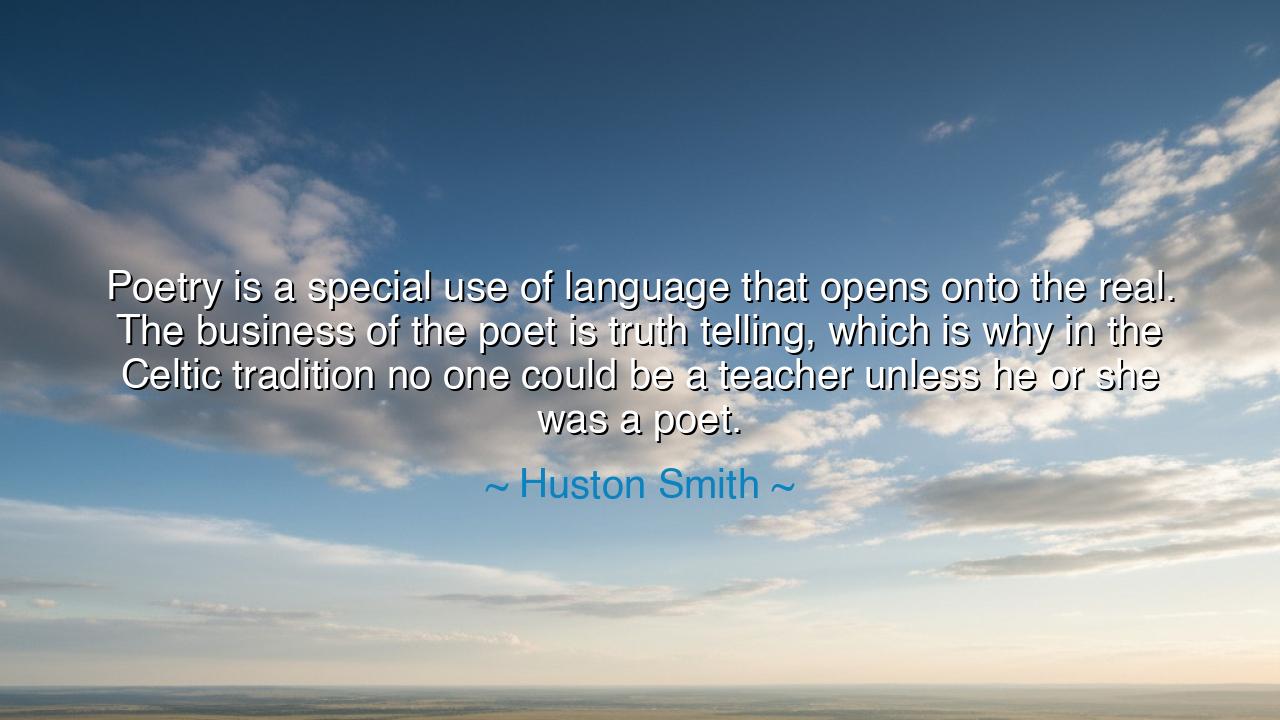
Poetry is a special use of language that opens onto the real.
Poetry is a special use of language that opens onto the real. The business of the poet is truth telling, which is why in the Celtic tradition no one could be a teacher unless he or she was a poet.






Hear now the words of Huston Smith, wise among the wise: “Poetry is a special use of language that opens onto the real. The business of the poet is truth telling, which is why in the Celtic tradition no one could be a teacher unless he or she was a poet.” Within these words lies a teaching older than empires and deeper than oceans—that the poet is not merely an ornament to the world, but its revealer, its seer, its truth-teller. Where others use language to persuade or to command, the poet uses words as keys that unlock the hidden chambers of reality. To Smith, and to the ancients he reveres, poetry is the language of truth.
Consider what it means that poetry “opens onto the real.” The everyday tongue is bound by utility—it names the bread, it measures the coin, it records the law. But poetry pierces the veil; it reveals not only what is seen, but what is felt, what is eternal. When the Celtic peoples demanded that every teacher must first be a poet, they were proclaiming this truth: that knowledge without beauty is barren, that instruction without truth’s music is lifeless. To teach facts is to fill the mind; to teach with poetry is to awaken the soul.
History gives us luminous examples. Think of Homer, whose verses shaped the entire Greek world. He was not a teacher in the classroom sense, but through his epics he instructed generations in courage, in honor, in the favor of gods and the frailty of men. His poetry was truth, and through it he taught a civilization. Likewise, in the Celtic lands, the bard was more than a singer—he was the memory of the people, the keeper of their history, the voice of their law. His words carried weight heavier than steel, for in his song lay both wisdom and authority.
The deeper meaning is this: truth must be spoken with beauty, or it will not endure. The raw stone of fact is not enough; it must be carved into form, given life through rhythm and image, so that it may lodge in the heart as well as the mind. This is why Smith tells us the business of the poet is truth telling—not entertainment, not cleverness, but revelation. The poet must speak what others cannot, must give shape to the invisible, and in doing so, must guide the people toward what is real.
But how often in our age do we see truth stripped of poetry, reduced to data, left cold and uninviting? The ancients remind us: when truth is divorced from beauty, it becomes brittle, and the people turn away. When truth is clothed in the garments of poetry, it becomes a fire that none can ignore. This is why the Celts demanded that teachers be poets—the teacher’s task is not only to instruct the mind but to stir the spirit, to make the invisible flame of wisdom leap alive in the hearts of their students.
What then is the lesson for us? It is this: in your speech, in your teaching, in your living, do not forget the poetic. Do not be content with conveying information; seek always to speak with depth, with beauty, with reverence for truth. Let your words be not only correct, but alive. Read poetry, speak it, breathe it, and let it sharpen your tongue to reveal what lies beneath the surface of things. For in this way, you do not merely speak—you reveal.
Thus, take up Smith’s charge: become a poet of truth in your own life. Whether you lead a classroom, guide a family, or simply walk among others, let your words be woven with both beauty and honesty. Do not use language merely to fill silence; use it to open doors onto the real. Remember always that the world is hungering not just for facts, but for meaning. And meaning, eternal and luminous, comes best in the language of the poet. For this reason, as the Celts knew, the teacher must also be the poet, and the poet must always be a servant of truth.






AAdministratorAdministrator
Welcome, honored guests. Please leave a comment, we will respond soon